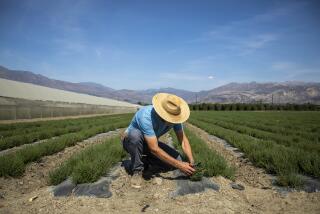Study Shows Farm Pesticides Pay--a Little : Agriculture: A test with strawberries finds that the chemicals yield 10% more profit than organic growing.
- Share via
FRESNO — Strawberries treated with pesticides produced 10% more profit than an organic crop in a side-by-side test.
Berries grown by conventional methods at a Central Coast farm had a net return of $5,489 compared to $4,995, factored to an acre each. University of California researchers conducted their experiment on a half-acre plot.
Labor was more expensive in the plot being switched to organic: $9,770 on a per-acre basis to $8,474 for the conventional strawberries. That was caused by additional weeding and picking time per unit of yield, the researchers said.
But materials cost more on the conventional plot: $13,693 per acre to $10,945 for the organic berries. That was because of soil fumigation, pesticides and fertilizers applied to grow the conventional strawberries.
Production costs, including interest, totaled $23,727 for the conventional plot, which was higher by $1,591 or 7% than the organic crop.
But the conventional field produced 3,652 trays on a per-acre basis compared to 2,261 for the organic plot--a difference of 1,391 trays, or 61.5% in favor of conventional farming practices.
That resulted in a gross value of $29,216 for the conventional crop and $27,132 for the strawberries grown organically. Deducting costs from those figures provided the net returns per acre, which favored conventional farming.
Still, the organic crop was profitable, the researchers pointed out in a recent edition of California Agriculture, the university’s magazine on agriculture-related research. That was partly because some people are willing to pay more for food grown without chemicals.
“The price differential for organic strawberries permitted a positive profit margin despite the lower production levels,” the researchers wrote.
However, they warned that premium prices that organic growers command now may not last as more people grow crops without chemicals.
“As the supply of certified, organically grown produce increases, this price may drop,” they said. “To maintain profits in such a market, yields will have to increase, and input and labor costs will have to decrease.”






